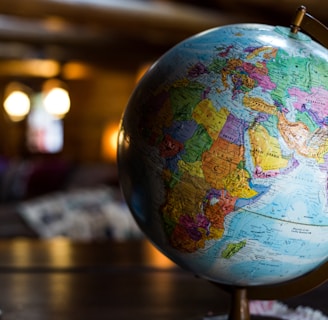Understanding the Impact of Geopolitical Events on Financial Markets
Geopolitical events like wars, elections, or sanctions can cause sharp market volatility and economic disruptions. Investors should adopt risk management strategies, diversify portfolios, and focus on long-term goals to navigate such uncertainties effectively.
6/17/20253 min read


Financial markets are sensitive to change—and one of the biggest disruptors is geopolitical events. From wars and political upheavals to international sanctions and policy shifts, such incidents can send shockwaves through global markets. These disruptions often result in volatile price swings, disrupted supply chains, and increased risk for investors and traders alike. A striking example is the Russia-Ukraine conflict, which triggered major instability in global energy and commodity markets.
To navigate such volatility, it’s vital for traders to remain alert to geopolitical developments and adopt strong risk management strategies. Let’s delve deeper into how markets react to these events and what investors can do to stay protected.
A Look at Historical Market Responses to Geopolitical Turmoil
History offers numerous examples of how global tensions affect the markets. Events such as wars, terror attacks, assassinations, major elections, and diplomatic crises have all historically led to economic uncertainty. For instance, elections often bring heightened market volatility due to the unpredictability of new government policies.
Take the return of Donald Trump to the White House as a recent example. Markets reacted sharply—major indices like the Dow Jones, S&P 500, and Nasdaq soared, Bitcoin surged to a new high, treasury yields climbed, and the US dollar gained strength. Elections typically spark market optimism or concern depending on the economic policies anticipated from the winning party.
However, not all geopolitical events result in long-term market damage. Often, after the initial reaction, markets tend to stabilize, with fundamentals like corporate earnings and interest rates eventually taking precedence. It’s also worth noting that while such events may cause short-term dips, markets historically have bounced back and gone on to set new records.
Geopolitical Shocks and Their Influence on Forex Markets
Currency markets are also highly sensitive to global tensions. Exchange rates can fluctuate dramatically in response to political instability. In extreme situations, trading may even be suspended. After World War I began in 1914, for example, stock and bond markets remained closed for months. Similarly, following the 9/11 attacks, US markets were shut for three days.
Geopolitical Risks to Watch in 2025
Looking ahead, several potential geopolitical flashpoints could impact global markets in 2025:
Heightened tensions between the US and China, potentially leading to economic sanctions or trade restrictions
Political instability driven by populism, social unrest, and polarised elections across major economies
Rising protectionism through increased tariffs, trade barriers, and export controls
Escalating cyber threats targeting financial systems and infrastructure
Conflicts in energy-producing regions that may affect global energy security
Climate-related disasters disrupting sectors like agriculture, construction, and tourism
A global shift towards nationalism potentially slowing international investments and trade
Smart Trading Strategies During Turbulent Times
When markets turn volatile due to geopolitical stress, it’s essential to adopt smart, defensive strategies. Here are a few that can help:
1. Diversify Your Portfolio
Spread your investments across different regions, sectors, and asset types. This lowers the overall risk by reducing exposure to any single market event.
2. Invest in Defensive Stocks
Sectors like healthcare, utilities, and consumer staples tend to be more stable during periods of turmoil. These "defensive" stocks usually hold their ground better when the market gets choppy.
3. Use Short Selling Tactically
Short selling allows traders to profit from falling prices in sectors likely to be hit hardest by geopolitical tensions. But it requires caution and solid market research.
4. Set Stop-Loss Orders
A well-placed stop-loss order helps limit potential losses by triggering automatic sell-offs when prices fall to a certain level. This disciplined approach can shield your portfolio during sudden downturns.
5. Stay Informed and Objective
Avoid making impulsive moves based on fear. Stay updated with reliable market news and data, and evaluate risks calmly before acting.
Hedging Against Geopolitical Risk: Time-Tested Tools
Hedging is a vital part of protecting your investments during uncertain times. Historically, investors have relied on specific assets that perform well in turbulent periods:
Gold is often considered a “safe haven” asset. Its value tends to rise during geopolitical instability and high inflation.
The Swiss Franc is viewed as a stable currency during global turmoil.
Oil can spike in price when conflicts threaten production in major oil-producing regions—though it’s also prone to volatility.
Inflation-linked bonds adjust in value based on inflation rates, helping preserve purchasing power.
ETFs, futures, and options are popular tools for building flexible, hedged portfolios that can respond to global developments quickly.
For example, if tensions escalate between oil-rich countries like Israel and Iran, it could disrupt nearly 18% of global oil production—leading to significant market movements.
Final Thoughts: Long-Term Perspective Matters
Sudden geopolitical events are part and parcel of the investing landscape. While they can trigger short-term panic and market drops, history shows that markets usually recover and move on. The key is to stay calm, stick to your strategy, and focus on long-term goals.
Being prepared with the right knowledge, diversification, and defensive strategies can help you weather any storm—and even find opportunities amidst the uncertainty.
